‘These days, I was thinking about a lot about “losing”. This is mainly because of life and chess I have learnt recently. So then finally I came to think back on Game theory to reflect on my life again. I don’t know either John von Neumann or Oskar Morgenstern came up with “Game theory” but naming “The Game theory” is brilliant. This is more like the study of strategic interactive decision making among rational players. No one starts learning this study with this naming strategic…. but you might be interested in the study is called the game theory.
I started writing this because of my friends comment about why people need to think about what the opponent thinks in the game. He is playing shogi and I started playing chess. So that was a profound question and I wanted to understand too. Then I started reading the game theory books back, I just have digested some of my questions I have had recently so I am writing.
So firstly, I started from the question I wanted to answer to my friend. To start with I need to talk from minmax theory. Let’s think about 2 basketball teams are in the game. Point is for A. Both teams can choose fast or slow attack (move or strategy, I am not sure what is called in game), if you were A’s couch, which move you would need to choose in this game?
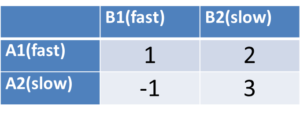
So you chose fast game, B will chose also fast. A probably wins. This is so called minmax strategy, you chose fast because you are trying to minimize your loss to maximize your benefit. You don’t chose slow game, you might get 3 but if B realize you are choosing slow game, they would play fast game to make you lose. So you end up -1 if you choose A1. You got it?
O.K, we can think of a bit more complicated game next. You can chose one of three moves, also B can chose also one of three moves. In this situation which moves you need to choose?
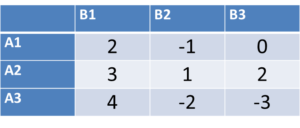
Let’s break down this situation, since you are A, you can chose A1, A2, or A3. Among them you won’t chose A1 over A2 because A2 does better against every move you chose even whatever B does. So the matrix can be easier like follow,
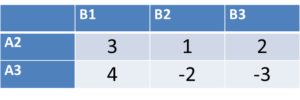 You just clear the A1, let’s think on the other moves. You can now think about what the opponent think. You get the idea, B should not chose B2 because B1 does better against every moves on A. So you can do minimize the matrix again.
You just clear the A1, let’s think on the other moves. You can now think about what the opponent think. You get the idea, B should not chose B2 because B1 does better against every moves on A. So you can do minimize the matrix again.
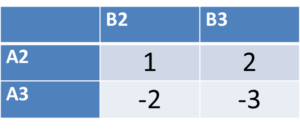
Now you get idea, as A you will chose A2 over the A3 so finally you and opponent end up with choosing A2-B2 .
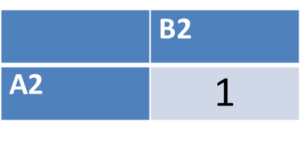
Let’s come back original situation. You now understand very well. Firstly we chose, so you should choose. So, now you realized you needed to choose your strategy after B thinks. He should chose column B1 because, for him, B1 column is better than B2.
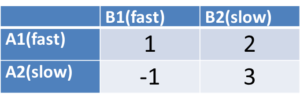
O.K. We finally got same conclusion. From A, you can chose minimax theory though, it not so clear why you need to choose A2, but know you need to think what B would do. So, sometimes you can easily see better choice by seeing what the opponent see the game. If I could prove it by this simple game, so you could see a lot of opportunities in real situations. So consider what the opponent thinks on field.
So next lesson is what I have learnt recently. Since 21th century is brutal age, the place I am living in Australia is not exceptional. I was looking for a room to share with, so I heard some guy was going to move out, I contacted, he said it should be O.K to take over his room then he suggested taking over his furniture too. We ended up with not renting his room though, since he is moving far from here he had to sell out all his stuff anyway. So, I was still interested in buying his TV so negotiation started,
Here is my decision making tree

So, by doing my homework, I did know I can buy 65inch 4k TV with A$800 at store with 1 year warranty. A$800 is maximum I want to pay for this second hand TV. I can go negotiate if he says TV is under A$800. (by going up on first branch).
Since he had to fly to move to the other place where is far from our town. So he needed to sell all out before he moves especially for big furniture in a week. For him, getting higher even A$1 is win so I can basically negotiate down to A$1 but I didn’t wanted to push hard since I doubted something fishy going on if the TV was too cheap he knows so he might have wanted to sell whatever prices? Or I push too much he might have done something terrible so both might lose. (3rd of second branch). So I would say A$300-A$600 is reasonable price for both of us.
And I also wanted to point out, in this game, I can’t lose because basically, I can almost always postpone to purchase. I can go store to by A$800 TV with 1 year warranty from store. So, I can always let this deal go, because I don’t need to have TV, I just was thinking of it is nice to have it if it is reasonable price. On the other hand, he had better sell it because he was moving out in a week.
O.K. So, are ready to meet him?
He originally offered A$1000 if I bought everything he had. He said “I want to raise the price because you are not buying all of my stuff, I would say $1200?”
???
What did he say?
Lessons :
- Don’t forget to do your homework, information asymmetricity is brutal.
- Game is for rational people. I was totally at better position, why did he want more from me?
- I don’t like the people who want to win even though the other loses. I would love to find ways both win or both little lose.
What I have learned was information is powerful. Maybe he didn’t know the price of TV he is offering is not attractive anymore in the market. You had better have more and more accurate information to make decision is better. We have to know comfortable enough to make these decisions. You should be able to know what reasonable price is for you. We should define as happiness functions as money as a main parameter in this case.
So irrationality, that surprised me why so people make irrational decisions without looking at the situation carefully. So now I am ready to talk about next Presidential campaign and Brexit to think about populism. But, it is time to go, maybe next time.
Reference
[1]Game theory training by Akira Aizawa; Kanki Publishing. (in Japanese)